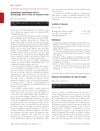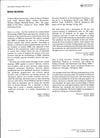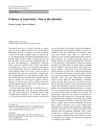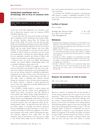 February 2018 in “British Journal of Dermatology”
February 2018 in “British Journal of Dermatology” We need better research to improve alopecia treatment and patient care.
 January 2025 in “International Journal of Molecular Sciences”
January 2025 in “International Journal of Molecular Sciences” Psoriasis involves immune and genetic factors, and understanding these can improve treatments.
 January 2020 in “Elsevier eBooks”
January 2020 in “Elsevier eBooks” Plant-based chemicals may help hair growth and prevent hair loss but need more research to compete with current treatments.
 December 2023 in “International Journal of Pharmaceutics”
December 2023 in “International Journal of Pharmaceutics” New nanoparticles deliver plant extracts to hair follicles to treat conditions like hair loss and acne.
 1 citations,
January 2015 in “Springer eBooks”
1 citations,
January 2015 in “Springer eBooks” The document says a skin condition called alopecia areata causes hair loss and stress, and is treated with strong skin creams, injections, or other therapies, but treatment success varies.
 January 2024 in “Biomaterials Research”
January 2024 in “Biomaterials Research” 3D-cultured cells in HGC-coated environments improve hair growth and skin integration.
 June 2021 in “Journal of dermatology and dermatitis”
June 2021 in “Journal of dermatology and dermatitis” Most dermatologists in Western Rajasthan prefer the anti-depressant Doxepin for elderly skin conditions and often refer patients to a psychiatrist.
 7 citations,
April 2021 in “Dermatology and Therapy”
7 citations,
April 2021 in “Dermatology and Therapy” H-1 antihistamines may help with various skin conditions, but more research is needed to confirm their effectiveness.
The serum is safe and effective for treating hair loss.
 1 citations,
February 2023 in “Journal of cosmetic dermatology”
1 citations,
February 2023 in “Journal of cosmetic dermatology” PRP use in skin care and plastic surgery is growing, especially in the U.S. and Italy.
 July 2022 in “Research, Society and Development”
July 2022 in “Research, Society and Development” The conclusion is that different treatments improved hair growth in dogs with Alopecia X, but results varied and not all dogs had complete hair regrowth.
61 citations,
October 2011 in “Experimental dermatology” Scalp itching is common and hard to diagnose due to the complex nerve structure of the scalp.
 26 citations,
May 2015 in “Lasers in Surgery and Medicine”
26 citations,
May 2015 in “Lasers in Surgery and Medicine” Laser treatment helped regrow hair in mice by activating a key growth pathway.
 January 2021 in “Erciyes medical journal”
January 2021 in “Erciyes medical journal” The COVID-19 pandemic changed the types of skin conditions seen at a clinic, with fewer patients and varying numbers of specific conditions.
 1 citations,
January 2005 in “Acta dermato-venereologica”
1 citations,
January 2005 in “Acta dermato-venereologica” The document recommends three dermatology books for their valuable content on evidence-based medicine, comprehensive treatment descriptions, and updated information on hair and scalp disorders.
 December 2016 in “British Journal of Dermatology”
December 2016 in “British Journal of Dermatology” The meeting highlighted the importance of genetic testing and multidisciplinary approaches in pediatric dermatology.
6 citations,
April 2023 in “Cosmetics” Exosomes could be effective for improving skin health and treating skin diseases.
 August 1994 in “Drugs & Therapy Perspectives”
August 1994 in “Drugs & Therapy Perspectives” Psoriasis treatments range from topical creams to systemic medications with serious side effects, and while treatments can manage symptoms, there is no cure.
 156 citations,
September 2014 in “British journal of dermatology/British journal of dermatology, Supplement”
156 citations,
September 2014 in “British journal of dermatology/British journal of dermatology, Supplement” Accurate diagnosis and effective oral treatment are key to managing tinea capitis and preventing its spread.
 July 2014 in “American Journal of Clinical Dermatology”
July 2014 in “American Journal of Clinical Dermatology” The editorial concludes that while evidence-based medicine is crucial, doctors should also use their own experience and consider patient preferences in dermatology care.
 18 citations,
March 1990 in “Archives of Dermatology”
18 citations,
March 1990 in “Archives of Dermatology” Cyclosporine cleared a woman's resistant skin condition quickly and kept it away for over a year.
2 citations,
January 2023 Nano-sized molybdenum may help treat hair loss and works well with minoxidil.
 31 citations,
May 2012 in “European Journal of Dermatology”
31 citations,
May 2012 in “European Journal of Dermatology” Menopause affects hair and skin; more research needed for treatment.
 58 citations,
December 2017 in “Journal of The European Academy of Dermatology and Venereology”
58 citations,
December 2017 in “Journal of The European Academy of Dermatology and Venereology” Microneedling can help stimulate hair growth, especially when used with other treatments, but it's not better than existing therapies.
 3 citations,
February 2005 in “Expert Opinion on Investigational Drugs”
3 citations,
February 2005 in “Expert Opinion on Investigational Drugs” New treatments for hair loss are being developed using molecular biology.
 October 2023 in “Applied materials today”
October 2023 in “Applied materials today” New treatment for hair loss using special microneedles shows promise in reducing inflammation and promoting hair growth.
 August 2024 in “Dermatology and Therapy”
August 2024 in “Dermatology and Therapy” Vorasidenib can cause unusual hair growth.
 March 2023 in “International Journal of Advanced Research in Science, Communication and Technology”
March 2023 in “International Journal of Advanced Research in Science, Communication and Technology” Various medicinal plants like Polygonum multiflorum, Red ginseng extract, and Zizyphus jujuba can potentially treat hair loss, offering benefits like low cost and multiple ways of working. Other effective natural substances include Pygeum africanum, Seneroa, Urtica dioica, and more.
 17 citations,
January 2021 in “Dermatology and Therapy”
17 citations,
January 2021 in “Dermatology and Therapy” Laser-assisted drug delivery has shown improved treatment outcomes for skin conditions and has potential to reduce side effects and treatment time.
 1 citations,
February 2018 in “British Journal of Dermatology”
1 citations,
February 2018 in “British Journal of Dermatology” The CWARTS tool is a promising method for assessing warts and could improve treatment and research.


























